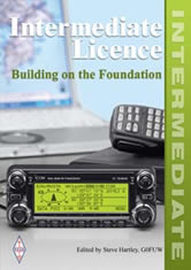The Next Step: The Intermediate Licence Courses

Now that you have your amateur radio licence and have gained experience operating, it may be time for you to move on to an Intermediate licence.
The Intermediate licence carries with it more privileges and also more responsibilities on you as a radio amateur. The main advantage of stepping up to the Intermediate licence is the increase in permitted operating power. You will be able to go from the 10 watts of the Foundation licence, up to 50 watts as an Intermediate licence holder.
The Intermediate course.
It’s actually not necessary to take a course to sit the Intermediate exam, but we would strongly recommend doing so. All our RSGB-affliated trainers have a wealth of knowledge and years of experience to impart to their students.
Understandably the Intermediate course is longer and more challenging than the Foundation.
It aims to teach many of the fundamentals of radio in a stimulating way by actually undertaking practical tasks such as soldering, building a small project and a variety of other exercises, building on the experience you have gained as a Foundation licence holder.
The Intermediate Exam.
Two methods of assessment are used. First, a practical skills assessment is taken which demonstrates your competentence in basic electronics. This involves soldering a rudimentary circuit together using some of the components you learned about on the course. This is followed by an examination of 45 multiple-choice questions each with four possible responses, which covers the remainder of the syllabus. The examination lasts 1¼ hours.
Your exam paper is marked on the spot by the invigilator straight after the exam so, as with the Foundation, there is no long wait to know whether you have passed or not.
What happens after the Intermediate exam?
If you have passed the Intermediate exam you will receive an official result sheet confirming the pass from the invigilator on the day of the exam.
The next step is to register your Intermediate exam pass with the UK communications regulator Ofcom, who are responsible for issuing amateur radio licences. If you apply for your Intermediate licence on the Ofcom website, your licence is free of charge. Visit the Ofcom website HERE to find out more. Ofcom will then issue you with your new, upgraded radio licence and you can get started immediately on the Intermediate frequency allocations at up to 50 watts power.
Now you are not only a licensed radio amateur, but you are one step closer to having the advanced licence; an internationally recognized qualification that will enable you to transmit legally almost nywhere in the world.
The Intermediate licence carries with it more privileges and also more responsibilities on you as a radio amateur. The main advantage of stepping up to the Intermediate licence is the increase in permitted operating power. You will be able to go from the 10 watts of the Foundation licence, up to 50 watts as an Intermediate licence holder.
The Intermediate course.
It’s actually not necessary to take a course to sit the Intermediate exam, but we would strongly recommend doing so. All our RSGB-affliated trainers have a wealth of knowledge and years of experience to impart to their students.
Understandably the Intermediate course is longer and more challenging than the Foundation.
It aims to teach many of the fundamentals of radio in a stimulating way by actually undertaking practical tasks such as soldering, building a small project and a variety of other exercises, building on the experience you have gained as a Foundation licence holder.
The Intermediate Exam.
Two methods of assessment are used. First, a practical skills assessment is taken which demonstrates your competentence in basic electronics. This involves soldering a rudimentary circuit together using some of the components you learned about on the course. This is followed by an examination of 45 multiple-choice questions each with four possible responses, which covers the remainder of the syllabus. The examination lasts 1¼ hours.
Your exam paper is marked on the spot by the invigilator straight after the exam so, as with the Foundation, there is no long wait to know whether you have passed or not.
What happens after the Intermediate exam?
If you have passed the Intermediate exam you will receive an official result sheet confirming the pass from the invigilator on the day of the exam.
The next step is to register your Intermediate exam pass with the UK communications regulator Ofcom, who are responsible for issuing amateur radio licences. If you apply for your Intermediate licence on the Ofcom website, your licence is free of charge. Visit the Ofcom website HERE to find out more. Ofcom will then issue you with your new, upgraded radio licence and you can get started immediately on the Intermediate frequency allocations at up to 50 watts power.
Now you are not only a licensed radio amateur, but you are one step closer to having the advanced licence; an internationally recognized qualification that will enable you to transmit legally almost nywhere in the world.

